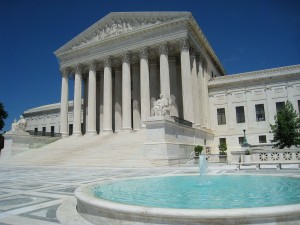Debunking the Refine of Federal Appeals: What You Required to Know
Browsing the intricate realm of federal charms can commonly look like going across undiscovered waters for those unknown with the procedure. Comprehending the subtleties of appellate court territory, the details of submitting a notification of charm, presenting a compelling brief, and making a persuasive oral argument are vital elements that can substantially affect the result of an instance. By unraveling the layers of intricacy bordering government charms, individuals can acquire a clearer insight into the devices that control this critical point of the lawful system.
Comprehending Federal Appeals Process
Looking into the detailed realm of the government charms procedure introduces a organized and methodical trip with the judicial system. Federal allures act as a critical device for examining decisions made by reduced courts. Understanding this procedure is important for anyone included in lawful process at the government level.
The process commonly starts with a party disappointed with a reduced court's judgment submitting a notice of appeal. This causes an evaluation by a higher court, where a panel of courts evaluates the lawful disagreements presented by both events. Briefs describing the legal reasoning behind each celebration's position are sent, and oral debates may be heard to make clear complicated concerns.
The appellate court's decision is based on a comprehensive examination of the reduced court's process and the disagreements provided. As soon as the appellate court reaches a choice, it can verify, reverse, remand, or modify the reduced court's ruling, offering clarity and finality to the lawful conflict.
Appellate Court Jurisdiction Clarified
Appellate court jurisdiction refers to the extent of situations that a specific appellate court has the power to choose and assess upon. Unlike trial courts that listen to cases for the very first time, appellate courts are restricted to evaluating choices made by lower courts.
Appellate courts have territory over particular sorts of cases, commonly those involving lawful mistakes, procedural problems, or inquiries of law as opposed to factual conflicts. The territory of appellate courts is usually described in laws and regulations that govern the court system. Comprehending appellate court territory is crucial for celebrations associated with the allures process as it determines whether a situation is qualified for testimonial and the extent to which the appellate court can intervene in the lower court's decision.
Declaring a Notification of Allure
The initial step in beginning the government charms procedure entails submitting a Notification of Appeal with the suitable appellate court. This vital record officially alerts the court and the various other parties involved in the case that the appealing party intends to seek a review of the lower court's decision. Filing a Notice of Appeal is a strict step-by-step need that establishes the appellate procedure in activity.
When preparing the Notification of Allure, it is vital to ensure conformity with the details regulations and standards of the pertinent appellate court. federal appeal lawyers. The document must normally consist of information such as the situation name, the lower court's name, the day of the judgment being appealed, and a concise statement showing the premises for the charm

Briefing and Oral Debate
In the appellate process, providing written briefs and participating in dental arguments play essential duties in advocating for the appealing event's placement before the appellate court. Briefs are detailed lawful documents that detail the events' arguments, legal authorities, and evaluation sustaining their positions. These composed entries give the court with a comprehensive understanding of the realities of the case, the relevant legislation, and why the appealing event believes the lower court's decision must be rescinded.
Following the submission and review of the briefs, oral disagreements supply the parties an opportunity to further clarify their placements, address any concerns the appellate judges might have, and emphasize crucial factors from their created briefs. Dental debates are an opportunity for the attorneys to navigate to these guys persuade the judges through verbal advocacy and actions to questions from the bench.
Both the created briefs and dental debates are crucial components of the appellate process, allowing parties to present their instance extensively and compellingly prior to the appellate court. - federal appeal lawyers
Receiving the Appellate Court Choice
The appellate court's decision is normally delivered in a composed layout and outlines the court's final thoughts on the lawful problems offered, the reasoning behind their decision, and the judgment made. The time structure for receiving the appellate court's decision can differ, but courts strive to supply prompt resolutions. Whether the appellate court affirms, reverses, or remands the lower court's choice, recognizing the implications of the ruling is vital for all events involved in the appellate process.
Final Thought
In verdict, the government appeals process is a complicated however vital action in seeking justice. Understanding the appellate court jurisdiction, filing a notice of charm, preparing briefs, and providing dental debates are all important elements of this process. Inevitably, receiving the appellate court decision can provide clarity and resolution to legal disputes. It is essential to navigate the federal charms process with diligence and attention to detail to achieve a reasonable end result.
As we proceed from comprehending the federal appeals procedure to studying the details of appellate court jurisdiction, an essential facet comes to light regarding the authority and restrictions of these higher courts in the lawful landscape. Appellate court jurisdiction refers to the extent of situations that a particular appellate court has the power to examine and determine upon. Unlike trial courts that listen to cases for the first time, appellate courts are limited to reviewing decisions made by reduced courts. Understanding appellate court territory is important for celebrations involved in the charms procedure as it determines whether a case is qualified for testimonial and the extent to which the appellate court can intervene in the lower court's choice.

Comments on “Experienced Federal Appeal Attorneys: Experienced Depiction for Complicated Cases”